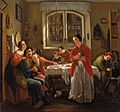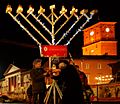German Jews facts for kids
German Jews are people who are Jewish and come from Germany, or who live in Germany today. They have a long and important history in the country.
Contents
Early History of Jews in Germany
Jewish people have lived in Germany for a very long time, even before Germany was a single country. They formed communities in many towns and cities. In the Middle Ages, Jewish people often had special roles in society, sometimes working as traders or moneylenders. They had their own customs and ways of life.
However, Jewish communities also faced many challenges. They were sometimes treated unfairly and accused of things they did not do. Sadly, this led to them being persecuted and even attacked in some places, like in Deggendorf in 1338 or Sternberg in 1492.
Enlightenment and Emancipation
In the 1700s and 1800s, a period called the Age of Enlightenment brought new ideas about freedom and equality. Important Jewish thinkers like Moses Mendelssohn helped to bridge the gap between Jewish traditions and modern European culture. People like David Friedländer worked hard for "Jewish emancipation." This meant gaining equal rights and freedoms for Jewish people, allowing them to participate fully in society.
During this time, Jewish people became more involved in German life. They joined the army, like Gustav Ermann in 1890, and contributed to many fields. Synagogues, which are Jewish places of worship, were built, such as the one in Celle in 1740, which is still used today.
Challenges and World Wars
Even with progress, Jewish people in Germany still faced prejudice. For example, the Hep-Hep riots in 1819 showed that not everyone accepted them. Despite this, many Jewish Germans felt very loyal to their country.
During World War I, many Jewish soldiers fought bravely for Germany. A leaflet from 1920 showed that 12,000 Jewish soldiers died for their country. Sadly, some of these soldiers, like Willi Ermann, were later killed in the Holocaust. After the war, the headstones of fallen Jewish soldiers were removed during World War II but were later replaced.
The Holocaust
The darkest period for German Jews was the Holocaust. This was a terrible time when the Nazis came to power in Germany. They believed that Jewish people were inferior and began to persecute them.
In March 1933, soon after the Nazis took control, Jewish people were publicly humiliated. There was also a boycott of Jewish businesses on April 1, 1933, which meant people were told not to buy from Jewish shops. Jewish people were forced to leave their homes and jobs. Their passports were marked, making it hard for them to return if they left Germany. Many synagogues, like the one in Nuremberg, were destroyed.
The Nazis systematically murdered millions of Jews. About 170,000 German Jews were killed in camps during the Holocaust. Jewish people were deported from cities like Würzburg to places like the Lublin District in Poland, where many were killed.
Jewish Life in Germany Today
After the Holocaust, the Jewish community in Germany slowly began to rebuild. Today, there are Jewish communities throughout Germany. Organizations like the Central Council of Jews in Germany help manage and support Jewish life in the country. Jewish traditions, like lighting the menorah during Hanukkah, are celebrated openly.
Images for kids
-
Jews wearing the pileus cornutus depicted ca. 1185 in the Hortus deliciarum of the Abbess Herrad of Landsberg.
-
Holy Roman Emperor Henry VII meeting Jews in Rome, 1312
-
Jews burned alive for unfair accusations in Deggendorf, Bavaria, in 1338, and in Sternberg, Mecklenburg, in 1492; a woodcut from the Nuremberg Chronicle (1493)
-
David Friedländer was a German-Jewish communal leader who promoted Jewish emancipation in the Holy Roman Empire.
-
The synagogue in Celle was built in 1740 and is still in use.
-
"The Return of the Volunteer from the Wars of Liberation to His Family Still Living in Accordance with Old Customs", by Moritz Daniel Oppenheim
-
1890: Gustav Ermann, a Jewish soldier in the German Kaiser's army, born in Saarbrücken
-
Willi Ermann of Saarbrücken, a German Jewish soldier in World War I: Ermann was murdered at Auschwitz in the Holocaust.
-
Heidelberg University was considered to be one of the most eminent institutions of Jewish-German learning.
-
Synagogue at Nuremberg, c. 1890–1900. The structure was destroyed in 1938.
-
Public menorah in Karlsruhe
See also
 In Spanish: Historia de los judíos en Alemania para niños
In Spanish: Historia de los judíos en Alemania para niños






















